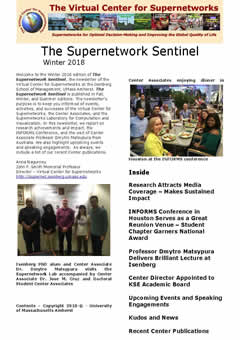Rather than jetting somewhere warm during spring break for a nice holiday, like some of my students, most certainly, will be doing, I will be in England (and I hope that the "beast from the east" has left by then and, along with it, the snow and cold).
Last summer I received an invitation to teach a masterclass in England at Lancaster University and was able to arrange my masterclass, which is on Network Equilibrium, to coincide with my spring break. The masterclass consists of about 8 hours worth of lectures and will be given to Master's and PhD students in Operational (Operations Research) and Statistics. I was invited by Distinguished Professor of Operational Research Dr. Kevin Glazebrook and was honored and delighted that I could accept the invitation. I have been enjoying preparing my lectures and am very much looking forward to meeting students there and also seeing numerous fabulous colleagues in my field. STOR-i is the centre hosting my visit. I will be covering theory as well as numerous exciting applications in my masterclass!
The first time that I taught outside of the United States was back in 1996 when I received a Distinguished Visiting Professorship at KTH (the Royal Institute of Technology) in Stockholm, Sweden. One of the goals of that program was to increase the visibility of female academics. So, with family in tow, off we went to live in Sweden. I thoroughly enjoyed having offices both in Systems Theory and Optimization and in Regional Planning. To get from one office to the other I hiked through the woods and crossed a river. I sometimes (actually, often) wondered what my daughter was doing in a Swedish daghes (daycare) while I taught a course and she dined on salmon and dilled potatoes and also learned how to climb trees and cliffs at a very young age! The 6 months we spent in Sweden were magical and I enjoyed teaching a class in optimization and networks. We returned to Stockholm, and lived at the Wenner Gren Centre, for extended periods multiple times. When an opportunity presented itself to be a Visiting Professor at the School of Business, Economics and Law at the University of Gothenburg (the second largest city in Sweden), I took it and in the last several years have had multiple visits there. I treasure my colleagues around the globe and the richness of the cultural experiences (plus food).
In 2002, I had a dream come true (my mother, who was a WW II refugee, always told me that if I had a chance to go to Innsbruck, Austria, that I should). I was offered a Distinguished Chaired Fulbright at SOWI at the University of Innsbruck, and, again, my family accompanied me since I not only did research (and elementary school children only go to school there for a few hours a day), but also taught a slew of courses. The first time that the SOWI students hammered on their desks after a lecture of mine with their fists, I was wondering what I had done wrong. This is actually a sign that they enjoyed my lecture very much!
Tina Wakolbinger, who was one of my students there, graduated, worked for a year in Austria, and then became my doctoral student at the Isenberg School of Management. She received her PhD in 2007, achieved Full Professor status in only 4 years and is now at the Vienna University of Economics and Business in Austria as a Professor of Supply Chain Services and Networks and Head of the Research Institute of Supply Chain Management. Clearly, a big success story, and also an example of what can happen if you stretch your boundaries and teach in another country. Tina invited me a few years ago to teach at her university, and I instructed an intense course on Humanitarian Logistics. A student in that course is now one of Tina's doctoral students.
From Sweden to Austria to Sweden and Austria and now soon off to England to teach and to acquire experiences that I share with my students back in the US!
Head of the Research Institute for Supply Chain Management
Head of the Research Institute for Supply Chain Management
































